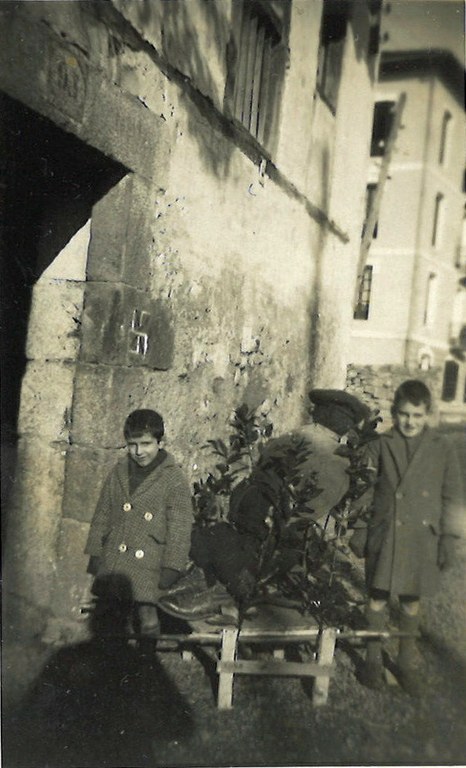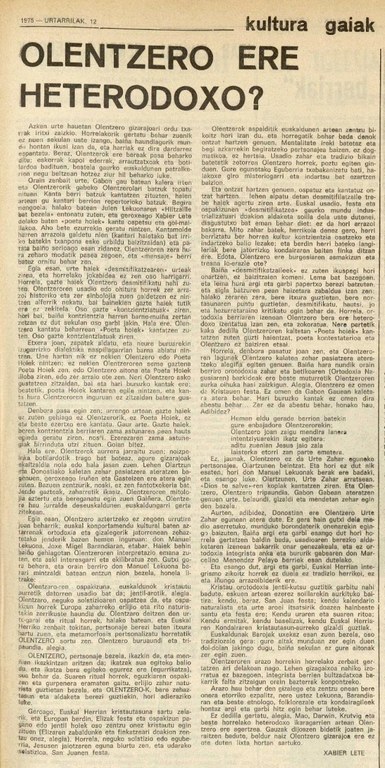
- Olentzero has enemies on one side and on the other. One reason or another, but the Olentzero is going to be marginalized. As today, almost 50 years ago, writer and singer Xabier Lete published a reflection on Olentzero in the middle of the debate. On the one hand, “conscious” and modern youth and on the other, new fundamentalists. Do both positions denounce the Olentzero that Xabier Lete wrote in 1975 also heterodox? Article 11.

Lete starts to reflect on the Olentzero after young Olentzero hear singing fashion songs, including one of his. He disagrees with the behavior of those who have wanted to leave Olentzero or transform it in his own way.
On the one hand, those who had abandoned Olentzero's tradition and wanted to invent the new Olentzero. He criticizes the young people who said that Olentzero's habit was outdated and that they had to dress up with new messages, saying that they had no ideas about the symbolism of historical motives and meanings of Olentzero's custom or tradition.

On the other hand, that of those who, like Olentzero, had evidence of rites and beliefs before Christianity, wanted to completely ignore the expression of kindness. They say that Olentzero is not the Christian festival, so you didn't have to go out into the street in Christmas Eve. On behalf of the new orthodoxy, Lete says that Olentzero himself was also named heterodox and relegated.
Here the full text of Xabier Lete written almost 50 years ago:
In recent years
poor Olentzero has lost hours. I would not have thought that would have happened, yes, it has been seen in this much larger world, and the stones have not been shaken by trembling. Therefore, Olentzero will also have to pass them; less well that he has nice capons, bounced and bottle, if he would not have to die cold in the black winter of today’s Basque petralquers.
A few years ago, a Christmas night I went out into the street and found some Olentzero without Olentzero. They sang some new songs, including some of the repertoire of the new singers. When I was watching, one day she was sung "As a Murderer" by Julen Lekuona, and soon after the famous and most famous song by a Xabier Lete. I kept my mouth full. I asked them about the reason for the Cantamoles (because one of those singers asked me for a coin with a laugh) and he told me that the Baian potato was more serious, that that of Olentzero was totally fashionable and had to be decorated with a new ‘message’.
In fact, those years were "years of demystification, and this kind of conduct was not very surprising. So those young people wanted to demystify Olentzero. I wasn't tired of wondering what historical reasons and what symbolism had that Olentzero custom or tradition, because I knew these young people knew nothing. They were very young ‘aware’, but I did not know very well what the inner jellyfish of consciousness was. However, instead of singing Olentzero they sang “the poets hois”. They were very conscious young people.
I went home, changed my shoes and left with myself through a naspillory dialectic. At the time I didn't know Olentzero or Poet Hoie was; I didn't know that Olentzero's youngest son was Poet Hoie, or that Grandpa Olentzero and poet Hoie were illoba, or what animal it was. I really liked Olentzero and his songs: on the other hand, the poet Hoie was the author of the song, and that song I didn't like anything about Olentzero.
Time passed, last year those young people didn't sing either Olentzero, or Poet Hoie, or anything else. So far. These young people, of course, were shattered under the heavy burden of their new conscience. It left the nightmares crushed out of nowhere. Two up.
However, the Olentzero continued, sometimes throwing a drink of the bottle, the poor old man suffered a storm. If we used to go for a walk in the streets of Oiartzun and Donostia, then they also left in Pamplona and Vitoria. It made sense, of course, it wasn't a fantasy. Young people, learning from the old, studied and assimilated Olentzero's mythology. To Gañe, when this Olentzero could be a vascuence of Basque territories.
The truth is that to study Olentzero you did not have to go far; the vestiges of a Basque cultural behavior existed around orthodoxy and more genuine humanity: Manuel Lekuona, José Miguel Barandiaran, etc. They, once again, had already given Olentzero's interpretation, and it was quite interesting and very spinning. More or less, and now that I heard Don Manuel Lekuona again in an intervention, it would be:
Olentzero’s celebration is a custom that comes from the time of the Gentiles before the Christian Basques. Olentzero is the celebration of the winter solstice, a celebration that has a lot to do with the natural religions and rites of the old Europe. This time and ritual, known as Olentzero, became a singular character in some places in the Basque Country, from which the OLENTZERO emerged. Olentzero buruaundi and tripaundia.
OLENTZERO, as a character, is a charcoal and is engaged in coal mining; coal is used to make fire and to make coal itself it takes fire with wood (coal). This ritual of fire leads us to celebration and worship of the sun, as in all ancient naturist religions, and the OLENTZERO, with all its particularities and variations, would express it.
Later, with the introduction of Christianity in Euskal Herria, and also in Europe, the Church crystallized with very good sense those pagan or Gentiles celebrations and celebrations (i.e., with the good sense of neglect and fixation of the Church). Thus, the winter solstice or Christmas, the day of the birth of Jesus, and the summer solstice, the feast of St. John.
Olentzero has long had that double meaning among the Basques, and that is why, if necessary, we all valued it. Because he was a non-dogmatic or tight character to look at with an open mind and quick eyes. This Olentzero came from an ancient and splendid tradition, we were delighted. The Christmas of our days to a chabacanized, which established a mysterious and strong atmosphere.
And we valued it as good, as celebrating and singing -- until those skilled demitigators appeared. To those who think that the “demystification” of Basque traditions, festivals and celebrations is a mere change in today’s industrialized world, I have to give you a little disgust, it is not the only reason. An old myth, being popular, could serve to complete and strengthen the cultural awareness of that same renewed people, and also for the staff of a people to determine their original legend. Or is Olentzero also an invention of the bourgeoisie and a maddening instrument?
Yes, the ‘demystifiers’ did not accept that vision because it did not suit them. There was a motto, clearly in special papelites, and under some acronyms it opened to the wind: what in all its appearances, in all the points of its personality, must be demystified, broken, beaten and criticized to the bones. Thus, in the name of the new orthodoxy, Olentzero himself was also a naturalized and zocorized heterodox. For my part, Kaka dedicates to all those who sang ‘Poetas hois’ to the detriment of Olentzero, because the poet of accountancy and the Olentzero were not enemies.
That's how time went by, and Olentzero's friends made the joy of walking down the street. The members of the ancient and eternal orthodoxy (Orthodoxy Nagusia) have once again screamed at the other end against the Olentzero. That is, Olentzero is not the feast of Christians. They say you don't have to go to the street in Christmas Eve. They say you don't have to sing their songs... What not to sing, this one, for example?
Come with a new gerade
our Ambassador with Olentzero;
Olentzero has gone to the mountain to work
carbonate with the intenciy;
Jesus was born in zuenia
He came to be part of it.
No, gentlemen, Olentzero is not the character of Old Year's Eve in Oiartzun. And I'm not saying that, that's also known by Manuel Lekuona, and I would say that. In Oiartzun, at the sunset of the Old Year, “God saves you” coplas were sung. And the Olentzero, the Olentzero tripaundia, as has been done over the years, generations, centuries that we were leaving at Christmas Eve.
This year, for example, Olentzero has also left Old Year in Donostia. Don't get bored because they would do it with the best will in the world. Yes, I will make it clear that if this happens, we can only accept it in the name of the natural change of custom, and not because the new Don Marcelino Menéndez Pelayo of Fundamentalist Orthodoxy said so.
And I'm going to say, clearly, that in Euskal Herria, this immense fundamentalism has no popular tradition or arguments of iñun.
If you want to clean up the Christian orthodoxy from all the gentle taste, because in between your hands you will find nothing: we will take away the feast of St. John; take away the naturalist kalendario and so many saints and parties that are glued to the seasons: Remove the rite of water and fire; remove the hermites, remove the hermites, remove all pre-Christian centuries from the Legend of the Basque Country.
As Euskaldunak Baroja said with the shakes, we stayed with tradition very much: let us know exactly what our father has done in the world, let alone what our grandfather did.
I think something like that is happening with this Olentzero problem. If before the poor man was not quite annoyed, now we only needed the push of the new fundamentalists to fix the corners.
Shipyards, theorists such as Lekuona, Barandiaran and other ethnologists, folklorists and legends, should talk about this clearly.
Nothing has happened, namely Mao, Darwin, Krutvig and many other heterodox as impressive as Olentzero. If things continue to walk the way they go, I fear that poor Olentzero will not enter that sandbox.
Xabier Lete, Zeruko Argia, 12-01-1975.
